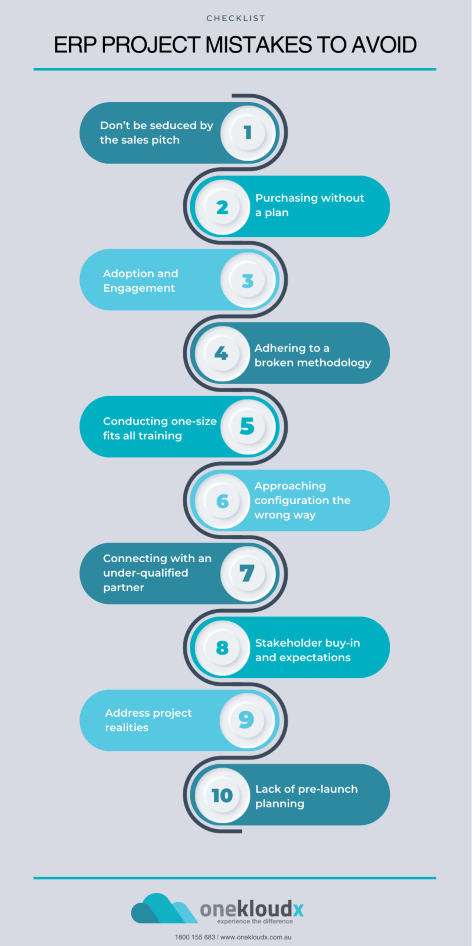
Understanding ERP implementation failures
Every business is in the midst of a digital transformation in one way or another. Every company is facing different challenges, but a common one that is shared by many is an ERP system rollout that has fallen off the track. But it doesn’t have to be that way.
It doesn’t have to become a nightmare. It can be avoided. This article discusses some of the top ten most common mistakes made during an ERP implementations and how they can be avoided.
Do you know the worldwide ERP implementation failures rate?
The worldwide ERP implementation failures rate is around 29%. But why almost one-third fail? We are at risk for making mistakes — no matter how much time, money or resources we devote to the process. Companies of all sizes are subject to making critical mistakes in the implementation process.
Over the years, I have experienced first-hand what it takes for companies to implement an ERP system. The surprise is that these mistakes are avoidable with foresight, proper planning, and properly engaging key resources.
Here are the top 10 considerations to avoid ERP implementation failures:
1. Do not be seduced by the sales pitch
Do not buy into a partner’s claims that they are the best and take pride in their record. It is best to buy a business outcome, instead of a specific feature set. Buying a sales pitch leads to a troublesome path: costly errors, missed deadlines, stolen plans, or poorly designed solutions.
2. Purchasing without a plan
Purchasing without a plan is an all-too-common problem. In this new digital age, having a clear plan of what to do and how is more important than ever. Even the ability to express a need or solve a problem does not mean that it will be done correctly. In order to determine which plans and ideas are actually feasible, businesses must know exactly who will be doing the job. The right partner will be able to commit to the project timeline and staffing model of your choice, while at the same time take into consideration other projects they already have in flight. A good services firm with an open-mind, flexible staffing model and an active process is best for a vendor to use.
3. Adoption and engagement
You need to have a plan in place for a new program. There are many unpredictable scenarios that can arise, such as user indifference or resistance to a change. The best way to ensure a successful rollout is to anticipate the issues that might come up and take steps to mitigate them as they arise.
4. Adhering to a broken methodology
There are several mistakes companies make when implementing an ERP system, and it can definitely hold them back from the start. Many of these include:
- failing to realize the ERP implementation is a two-way process,
- not considering the business impact of migration,
- lacking necessary business knowledge to utilize the system,
- looking at the cost vs. benefit analysis for the project,
- locking scope before requirements are fully known, and
- failing to determine roles and responsibilities
5. Conducting a one-size-fits-all training after go-live
If employee engagement is a priority from the start, then training begins at the project start, and throughout every stage until the implementation is completed. This results in employee engagement, adoption and knowledge from the beginning scaling as the project progresses. A well-designed training process takes into consideration the particular needs of a company, its customers, and its employees can increase levels of customer satisfaction and loyalty.
6. Approaching configuration the wrong way
Good system configuration is one of the most important in your ERP implementation process. The best ERP software is flexible and adaptive to the needs of your business — it shouldn’t be set in stone. ERP systems should adapt to how your business works, not the other way around.
7. Connecting with an under-qualified partner
There are many things that can make a provider under-qualified, therefore you must determine if the vendor’s qualifications are not only adequate in terms of general expertise, but also as to whether the vendor is the right fit for your business.
- Business acumen level
- Experience and practical knowledge with the NetSuite ERP that the allocated team members have on an individual basis
- Allocated team members experience in business, project management and leadership experience
- NetSuite native capabilities comprehension and third-party solutions availability
8. Buy in and expectations
Engagement and involvement before the sale can determine the success of your initiatives once it is underway. In order to gain buy-in and set expectations, there should be pre-decision involvement of key staff and executive level endorsement of the project to plan backfill for staff involved in the project, and identification of staff roles before, during, and after the project launch. Risks should be regularly evaluated, communicated, and mitigated throughout all stages of the project to ensure alignment of staff skills, understanding, learning capacity, and time.
9. Failure to address project realities effectively
Project realities, such as timeline, scope and cost balance, need to be addressed in detail within the project plan, including milestone dates attached to real business drivers (e.g. IPO, acquisition, new market expansion, business succession plans, or business sale). With a modern, cloud-based platform, many paths are possible for bringing functionality into a company. This is both a benefit and product of a flexible architecture where we can build upon the customer’s requirements and can pivot and change legacy systems. It is important to keep in mind the impact to the timeline and cost for different variations in scope, phasing, and architecture.
Also, beware of “project fatigue,” which can happen during the sales cycle of the project and often results in poor decision making. Project fatigue can set in at any stage of the project, especially with less experienced project members, who aren’t familiar with the phases and big picture.
10. Lack of pre-launch planning
Before you undertake an ERP implementation, you need to ensure that your vendor has the ability and capacity to meet your goals. It is important to begin with a long-term plan to ensure that your vendor can meet the needs of your business. Here are a few questions to ask ahead of time so that you can determine how well a vendor is equipped to provide the solutions you need.
- Does the partner plan to be around after go live?
- Is there a formal ongoing programme for post-launch support?
- Does the partner have ongoing viability that ensures that they will be around to help and advocate long after go-live?
- Does the partner’s implementation methodology and onsite/offsite model make sense?
- Will the partner staff be learning on the job or are they already experts?
- Does the vendor have a services deployment strategy make sense from a dedicated (single project) vs. multi-project standpoint?
Checklist to avoid an ERP Implementation failure
There is a lot to think about when you’re planning on integrating ERP software. The good news is that these mistakes can be avoided by thinking of your NetSuite ERP purchase as something greater than “buying software.” You are not only investing in technology, but you are also investing in a relationship with an entrusted connection that will last for a long time which will serve as the key components of the overall business outcomes.

Curious about NetSuite?
NetSuite is a full, cloud-based enterprise resource planning (ERP) suite that gives organisations what they need to run efficiently and accelerate seamless scalable growth. Supporting 37,000 customers in 219 countries and territories worldwide, NetSuite has everything you need to grow, in one place, on a single cloud platform.
If you are considering an ERP solution, take a look at what we do, how we got here, and how NetSuite works. Our FlexSafe™ methodology ensures that every NetSuite implementation is meticulously executed that is transparent, collaborative and increases user adoption by reducing change resistance. We have a proven track record of success in business access, process expertise, and providing scalable cloud solutions.
Our award-winning team helps you make the most of NetSuite, so you can focus on what really matters – your customers, your people, and your business.
Schedule a demo time in our calendar, or if you want more information call us on 1800 155 683.







